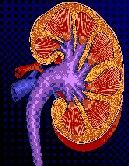Study Shows Tolvaptan is Effective in Treating Autosomal Dominant Polycystic Kidney Disease
Results from the TEMPO trial presented at Kidney Week 2012 show that treatment with tolvaptan slowed the increase in total kidney volume and the decline in kidney function in patients with Autosomal Dominant Polycystic Kidney Disease (ADPKD).
Results from the TEMPO trial presented at Kidney Week 2012 show that treatment with tolvaptan slowed the increase in total kidney volume and the decline in kidney function in patients with Autosomal Dominant Polycystic Kidney Disease (ADPKD).

The vasopressin V2 receptor antagonist drug tolvaptan slowed the rate of kidney function decline when tested in a large placebo-control clinical trial, according to results presented at Kidney Week 2012 held in San Diego and sponsored by the American Society of Nephrology.
The Tolvaptan Efficacy and Safety in Management of Autosomal Dominant Polycystic Kidney Disease Outcomes (TEMPO) study is three-year, multi-center, double-blind, placebo-controlled study that involved 1,445 patients with Autosomal Dominant Polycystic Kidney Disease (ADPKD), an inherited condition that causes cysts within the kidney that destroy tissue and cause pain, hypertension, and kidney failure, said Vicente Torres, MD, Professor of Medicine, Division of Nephrology and Hypertension at the Mayo Clinic.
Current management of ADPKD is focused on treating disease complications, not on slowing cyst development or preventing progression to kidney failure, said Torres. Although the trial met its main efficacy endpoint, Torres said that the study is still in the investigational phase and reminded the audience that tolvaptan does not have FDA approval for treatment of ADPKD.
Tolvaptan is a vasopressin V2 receptor antagonist that is approved by the FDA for the treatment of “clinically significant hypervolemic and euvolemic hyponatremia [serum sodium <125 mEq/L or less marked hyponatremia that is symptomatic and has resisted correction with fluid restriction], including patients with heart failure, cirrhosis, and Syndrome of Inappropriate Antidiuretic Hormone (SIADH).”
Patients in the TEMPO study were randomized to receive tolvaptan in daily doses of 45/15 mg, 60/30 mg, or 90/30 mg as tolerated, or to receive placebo. Of those who received the study drug, 55% tolerated the highest dose, Torres said.
The study met its primary outcome of annual rate of change from baseline in total kidney volume (2.80% for tolvaptan versus 5.51% for placebo), a measure of disease progression.
Study results showed that when given to patients for three years, tolvaptan slowed the increase in total kidney volume and the decline in kidney function, and lowered the frequency of ADPKD-related events, Torres said. Patients who took tolvaptan were 61% less likely to experience a certain level of worsening kidney function and 36% less likely to experience kidney pain that required treatment.
There were fewer ADPKD-related adverse events in the tolvaptan group but more events related to aquaresis (excretion of electrolyte-free water), which led to discontinuing of the drug in 8% of the study drug population. Hepatic adverse events unrelated to ADPKD, contributed to a higher discontinuation rate among patients who took the study drug (23%, vs. 14% in the placebo group). Clinically significant increases in liver enzymes also occurred in roughly 4% of patients who were closely monitored.
The study is sponsored by Otsuka Pharmaceuticals, which in 2009 received FDA approval for tolvaptan for the treatment of hyponatremia under the brand name Samsca.